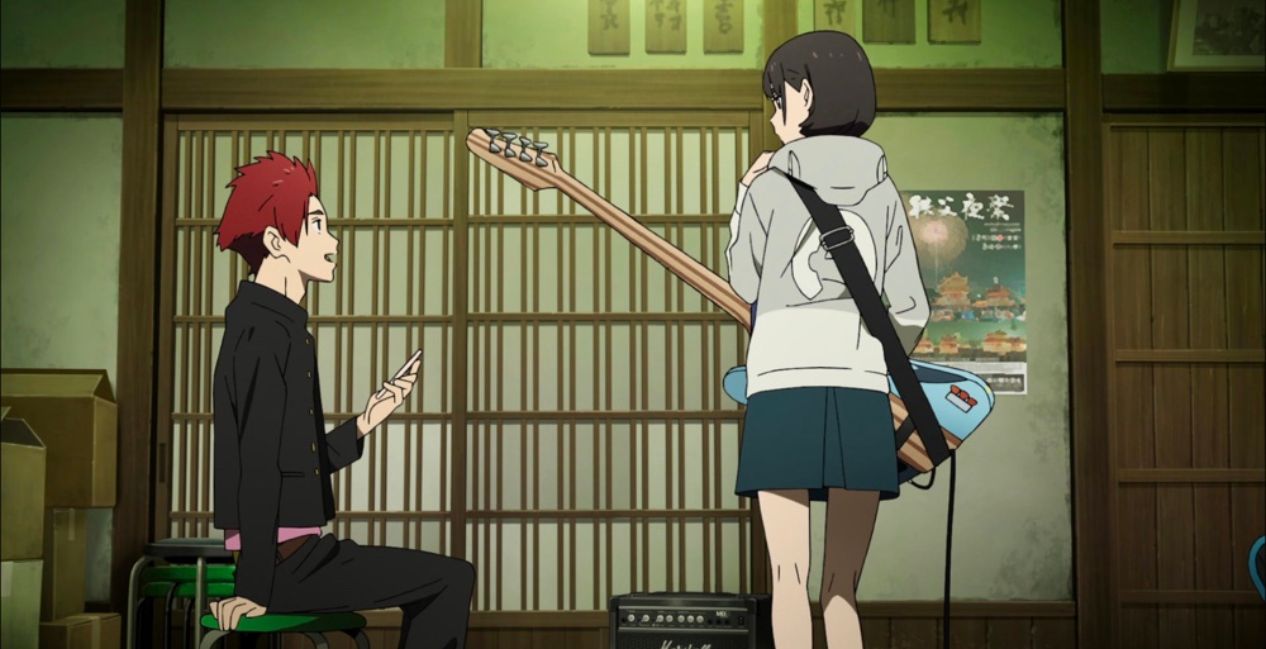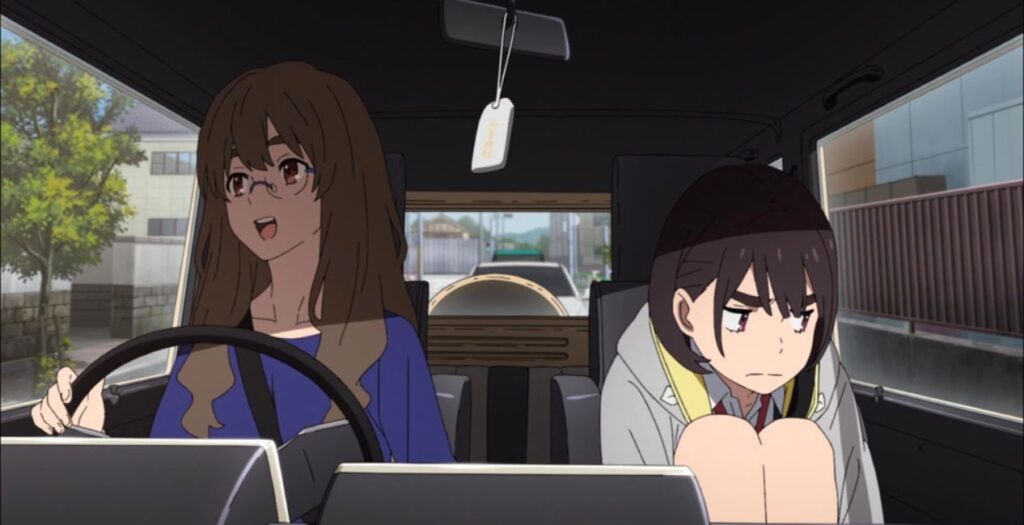In Her Blue Sky, Aoi Aioi (Shion Wakayama, Dan Da Dan) lives with her sister Akane (Riho Yoshioka, Gannibal) in a small town in the Japanese countryside. Nearing the end of her school years, Aoi plans to leave for Tokyo to become a famous bassist. But when a ghost from her and her sister’s past appears one day, everything Aoi thought she had figured out comes into question in Her Blue Sky from CloverWorks, directed by Tatsuyuki Nagai and written by Mari Okada (Oni: Thunder God’s Tale).
When Aoi was young, she’d always hang out with Akane. She loved spending time with her, especially when Akane’s friend’s band would practice. She dreamed of becoming a bassist and performing with them. Akane’s boyfriend, Shinnosuke (Ryô Yoshizawa, My Hero Academia: World Heroes’ Mission), was always particularly kind to the young girl. But the happy times ended when Aoi and Akane’s parents died in a tragic car accident. Shortly after that, Shinno left for Tokyo to become a guitarist. While he asked Akane to go with him, she couldn’t leave Aoi alone and stayed behind. Fast forward 15 years later…
While many great elements must come together to form a memorable tale, none are more critical than nuance. While a simple narrative is easier to follow, complexities draw the viewer in. This is where revelations and questions are born within the viewer’s mind. This is how a narrative makes itself feel real. Life has been described in a great many ways, but no one who has ever lived would call it simple.
Her Blue Sky gradually introduces the viewer to its world. After the opening setup in the past, we meet Aoi and Akane as they go about their normal days. Aoi plays the bass while waiting for her sister to pick her up. Once together, the pair feel indiscernible from any other close siblings.
While the film doesn’t use much of its little under two-hour run time to establish the duo, the time it takes is important and used effectively. These first moments with them establish what feels like a straightforward relationship. Allowing the viewer to gain a fixed image of the pair makes the following sequences more powerful, as some elements are built up with further clarification while others are revealed not to be the whole truth.
The trigger for the events that change the course of Aoi and Akane’s lives is the appearance of Shinno’s teenage self in the building where Aoi practices. With no clear reasons for how or why Shinno has returned, Aoi begins considering what could have caused this seemingly impossible event and what must be done to set the world right again.

The appearance of this visitor from the past sends Aoi on a collision course with old feelings that had long been buried. Her feelings towards her sister, her future, and Shinno himself all come crashing together as she tries to come to terms with what’s happening.
Her Blue Sky brings Aoi’s struggles to vivid life. The writing and voice work come together to deliver a convincing portrayal of a teenager trying to keep her head above the emotional waters. The film’s work reaches a powerful crescendo when Aoi wrongly lashes out at her sister.
As the young girl vents her feelings, we also get an internal monologue from her, acknowledging the unfairness of what she is saying and how she actively doesn’t want to say what is coming out of her mouth. Driving emotional momentum, though, causes her to continue delivering hurtful statements to a sister who has done nothing but care for her.
While Aoi’s story delivers an emotional maelstrom that is easy to get swept away in, Akane’s side of the story is no less powerful, though it is noticeably more subdued. When the woman faces the choices of her past, Her Blue Sky delivers a layered exploration of love and regret, much of which is shown but never said.
It is through Akane that the movie centers on the theme of regret. Having stayed with her sister rather than follow her boyfriend, Akane was forced to make an unfair decision. The beautiful thing about Akane’s character is how the movie gets across the fact that Akane is of two hearts for her situation. While she regrets not going with Shinno, she loves her life with Akane. While these concepts feel opposed, Akane’s character comes through feeling truly human for this contradiction. By holding both truths, she can embody the multitudes a person can contain within themselves.
Despite all the trials and tribulations the characters endure, the final stretch of Her Blue Sky manages to bring an uplifting end to the narrative. Gorgeous visuals and spirit-lifting music come together with heartfelt writing in the final stretch of the film to bring the film to a happy close. But while it does end on a high note, the ending doesn’t go so far as to make it feel like an artificial “happily ever after” ending. There are still things to be done, but everyone’s feet are on the right path now.
While I largely loved how Her Blue Sky brings its story together, there is one glaring narrative hole. While the regrets of the past get sorted, Aoi and Akane’s present-day relationship feels underserved in the film’s ending. There are some challenging moments in the film between the two that never get resolved. After a dangerous encounter in the third act, it’s clear that the two are on good terms again, but the harshness of those earlier moments is never actually addressed. This leaves an unfinished blemish on an otherwise fantastic finale.
Her Blue Sky does a fabulous job of exploring the complexities of regret and love. Lovely visuals and top-notch voice work back up the nuance it uses to explore its subject matter. Despite some elements of the film feeling not fully resolved, the great moments within this story still make it an emotionally fantastic journey.
Her Blue Sky is streaming now on Netflix.
Her Blue Sky
-
Rating - 8.5/108.5/10
TL;DR
Her Blue Sky does a fabulous job of exploring the complexities of regret and love.







